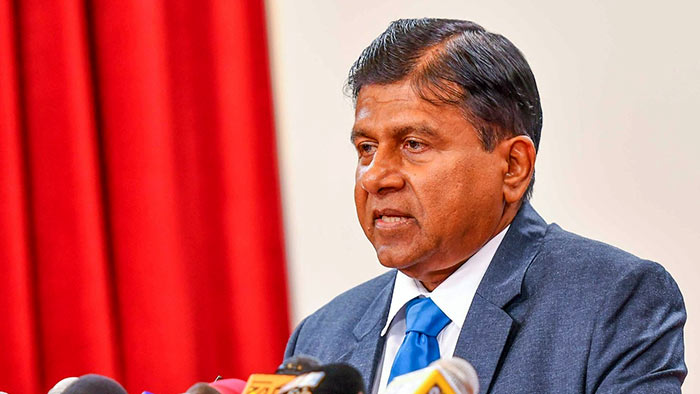No Elections postponements expected due to Electoral Amendments – Minister of Justice

Justice, Prison Affairs and Constitutional Reforms Minister Dr. Wijeyadasa Rajapakshe assured that the election amendment bills presented to Parliament are not anticipated to result in any postponement of elections.
The minister highlighted that promises to combat corruption and reform the electoral system have been made in presidential elections since 1994, but none have been fulfilled.
He also noted that President Ranil Wickremesinghe has already submitted amendments aimed at tackling corruption and implementing a proportional election system.
Justice, Prison Affairs and Constitutional Reforms Minister, President’s Counsel Dr. Wijeyadasa Rajapakshe was addressing a press briefing held at the Presidential Media Centre on Monday (March 25) under the theme of “Collective Path to a Stable Country”.
Minister Wijeyadasa Rajapakshe, adding to his remarks, also stated:
As a critical democratic principle, it’s essential that people are informed about the laws being proposed in Parliament. Currently, our country’s law only recognizes rape as a violation against women. However, with the new amendments, the law can be applied irrespective of the victim’s gender. For instance, sexual violence perpetrated by a husband against a legally separated wife will be considered rape under these amendments. Furthermore, there’s a proposal to strengthen the penalties for coercion occurring in police custody, prisons, or under someone else’s control.
Furthermore, I want to mention that there has been a recent amendment to the law, which now stipulates a ten-year prison sentence for minors involved in corruption. These legal changes come after a thorough study conducted by a team of senior lawyers spanning approximately four years. It’s worth noting that several social activists are expressing their concerns and objections regarding these amendments. Additionally, certain parties have taken the step of challenging this bill in the Supreme Court.
I would like to highlight that along with other developments, an election amendment bill has recently been submitted to Parliament. Reflecting on historical context, in 1994, Mrs. Chandrika Kumaratunga ran as a presidential candidate and made three significant election promises. These included abolishing the executive presidential system, combating corruption, and abolishing the proportional voting system. Additionally, the bill suggests the appointment of councilors responsible for specific divisions. Despite several amendments to the constitution over time, no changes have been made to alter the electoral system as of yet.
The 19th Constitutional Amendment led to a notable decrease in the powers of the President. Previously, the President enjoyed immunity from prosecution, even in cases as serious as murder. However, the amendment altered this provision, removing presidential immunity. Consequently, the courts have ruled against four presidents, underscoring a shift in legal accountability for presidential actions.
Furthermore, a commission with legal authority has been established to combat corruption. This commission is empowered to oversee the assets and liabilities of individuals ranging from the president to the lowest-ranking officer.
Numerous amendments related to this commission have been presented thus far, aiming to formalize the Corruption Perceptions Commission as an independent entity. Since 1994, each presidential candidate has pledged to address corruption during elections, yet none have followed through on these promises. However, under the leadership of President Ranil Wickemesinghe, an amendment has been proposed this year to implement a proportional election system and fortify measures against corruption.
In countries such as India, England, and America, the electoral systems include the constituency system, which aims to represent all segments of the population, including the marginalized. I believe that introducing a senate system would further enhance representation, ensuring that every constituency is adequately represented. Unlike in parliamentary elections where popularity often dictates representation, a senate system would allow for the appointment of talented individuals who may not be as widely known. This would lead to a more diverse and capable parliament, reflecting the varied expertise and perspectives of the population.
There has been speculation in society about the possibility of postponing elections due to the electoral amendments currently under discussion. However, it’s important to clarify that none of these amendments are intended to delay elections in any way. There are two upcoming elections, and candidates participating in these elections can also share their views on the proposed electoral amendments. This engagement will provide an opportunity for the public to contribute to the discourse on these amendments and have a say in shaping election processes.
(President’s Media)
Latest Headlines in Sri Lanka
- Sri Lankan President orders swift livelihood restoration for disaster-hit communities December 13, 2025
- Sri Lanka receives over USD 7 Billion in remittances in 2025 December 13, 2025
- Sri Lanka Parliament summoned to meet on December 18 December 13, 2025
- Sri Lanka and Italy renew agreement on mutual recognition of driving licenses December 13, 2025
- Asoka Ranwala granted bail December 12, 2025


